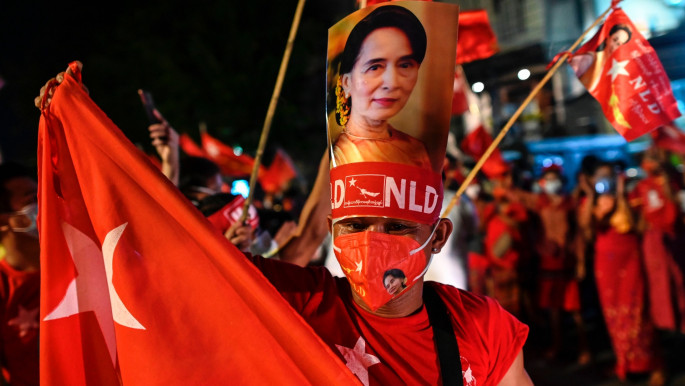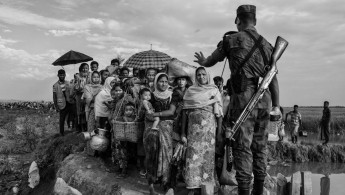What Myanmar's coup means for the future of Rohingya Muslims
"We already know how we will suffer if we go back. We are already living in open-air prisons, we cannot be recognised as citizens, we cannot travel, we cannot work for our livelihood, we have restricted access to healthcare. They want us to go back so we can work in factories built by China and other investors - it will be like Auschwitz."
Ro Nay San Lwin is one of the many members of the Rohingya - a Muslim minority group that has been persecuted under brutal military rule in Myanmar since the army took power in 1962, and which UN Secretary-General Antonio Guterres has described as "one of, if not the, most discriminated people in the world".
Myanmar boasts around 140 ethnic groups living within its borders - a product of British rule, which only ended in 1948 and still holds consequences today.
"Myanmar is very diverse, it has people of different faiths and ethnic traditions, and about 40 of these groups have been at war with the government in the past 30 years," Claire Thomas, Deputy Director of Minority Rights Group International, told The New Arab.
"One of the things the democratic government was able to achieve was to open peace negotiations with a majority of those groups. The coup might spark a resurgence in these conflicts because the peace talks were still unfinished."
 |
General Min Aung Hlaing - one of the main architects of the genocide against the Rohingya - is now in power, so I think it's really hard to imagine how there can be any safe repatriation to Myanmar |  |
There is widespread fear that the military will repeat a violent crackdown on Rohingya Muslims like the one seen in 2017, where troops backed by local extremist Buddhist groups set their villages ablaze and targeted civilians, according to testimonies by Rohingya refugees based in Bangladesh.
Amnesty International reported that the military raped and abused Rohingya women and girls, and Médecins Sans Frontières reported that around 6,700 adults and at least 730 children were killed during this period.
 |
|
| Read more: After Myanmar's coup |
For this reason, more than 700,000 Rohingya were forced to flee into neighbouring Bangladesh for safety, settling into the Kutupalong camp in Cox's Bazaar - the world's largest refugee camp.
The UN recommended that the Buddhist-majority country should protect the Rohingya from genocide, but the army denied claims it targeted civilians, and the country's now-ousted leader Aung San Suu Kyi rejected accusations of genocide.
Claire Thomas from Minority Rights Group says she spoke with minorities on the ground in Myanmar who were "outraged" and "nervous" after the military coup, but also not surprised by the swiftness with which they took over.
"There is a kind of sense of fatalism because the military had never taken their hands off the reigns," she told The New Arab.
"A lot of people in Myanmar perceived that the military called the shots even during the civilian government. I don't want to undermine the gravity of the situation, but it feels more like a veil has been stripped rather than a 360-degree change."
 |
The international community, especially the US, UK, and the EU are really concerned with the coup but they should also not forget the genocide of the Rohingya is ongoing |  |
But for many of those living in Kutupalong refugee camp - characterised by notably poor living conditions - the military coup presents another insurmountable challenge to those waiting to return home.
"I spoke with some of my friends living in Rakhine state, and they are really scared. The coup really affects the Rohingya's chances of repatriation - it's really bad for us," says an 18-year-old Rohingya living in Cox's Bazaar in Bangladesh, speaking to The New Arab. He spoke under the condition of anonymity, scared of what might happen to his future if he were to openly speak out against the military.
"Some people took [the coup] positively because Aung San Suu Kyi defended the genocide of the military in Myanmar. They think maybe under the pressure of the international community the military will do more for us. Maybe they will take the Rohingya back to Myanmar to show the international community they can do some good things," he added.
"Others are worried, like me. I believe the coup is really bad because Myanmar was a democracy and we had a chance to solve this [ethnic] crisis peacefully."
 |
|
| Read more: The Rohingya crisis and Myanmar's dark road to democracy |
For now, UN-backed efforts to repatriate Rohingya refugees back to Myanmar have stalled, with rights groups forewarning an increased danger for them.
"A necessary condition for safe and voluntary return has been holding the military accountable," says Akila Radhakrishnan, president of international human rights organisation Global Justice Center.
"Senior General Min Aung Hlaing - one of the main architects of the genocide against the Rohingya - is now in power, so I think it's really hard to imagine how there can be any safe repatriation to Myanmar. A risk of atrocities is certainly heightened."
Radhakrishnan says the lack of accountability of the military throughout more than 50 years of rule is to blame for the fragility of the country's democracy.
 |
There was so much excitement over the transition to a civilian government that it was often ignored that the military themselves drafted the constitution and gave themselves a central role in the hierarchy of power |  |
"There was so much excitement over the transition to a civilian government that it was often ignored that the military themselves drafted the constitution and gave themselves a central role in the hierarchy of power within the country."
The UN already brandished the 2017 attacks on the Rohingya as having "genocidal intent", but many believe this needs to go further, and Radhakrishnan believes the military's economic activities need to be strangled by the way of sanctions.
For this reason - while the eyes of the international community are finally on Myanmar's military - Ro Nay San Lwin is directing the efforts of the Free Rohingya Coalition and the Boycott Myanmar Campaign to rally states across the world to not only denounce the coup, but to also demand recognition of the insurmountable suffering his people have endured.
 |
|
| Read more: Satellite images reveal mass destruction of Rohingya villages |
"The international community, especially the US, UK, and the EU are really concerned with the coup but they should also not forget the genocide of Rohingya is ongoing, so even if the coup gets resolved they have to keep pressure to end the genocide," he told The New Arab.
"They have to intervene in the repatriation tripartite agreement between Bangladesh, Myanmar, and China to ensure the safe return of Rohingya refugees."
Another concern is that these repatriation talks have been spearheaded by China, which has been accused of genocide on its own territory due to the persecution of Uighurs in Xinjiang. China has also halted efforts by the UN Security Council to denounce the military coup in Myanmar, so the plight of the Rohingya is in the hands of regional and global political powers, and not just at the national level.
For Ro Nay San Lwin, "without China the military would not have carried out the coup." His demands for the safety of his people are few: "We want citizenship rights and the right to go back to our village with the protection asserted especially by the international community. Without these we come back to danger, because the cycle of violence has been repeated again and again against the Rohingya."
Gaia Caramazza is a staff journalist at The New Arab. Follow her on Twitter @GaiaCaramazza



